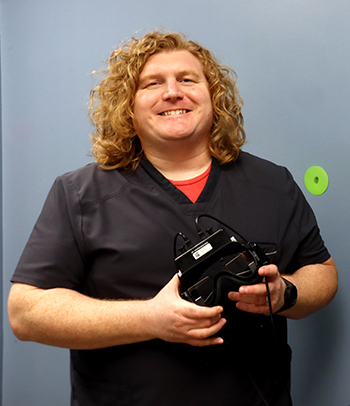What is vestibular balance disorder?
Family Health
St. Joseph’s/Candler Audiologist Patrick Pead explains how the anatomy of the ear can cause dizziness
Do you find yourself feeling dizzy or have trouble maintaining balance? Do you feel like objects are moving when they aren’t or feel like you’re falling when you aren’t?
It may surprise you that it’s most likely due to an injury to your ear.
“I do have some patients that come in wondering why I am asking about their ears when their issue is with balance,” says Patrick Pead, audiologist with St. Joseph’s/Candler Center for Oto-Neurology. “Although small, the components of our ears play a large part in neural input that you need to function.”

Your ear is a complex system of bone and cartilage. Within it is a network of canals called semicircular canals. The canals are filled with fluid, explains Pead. The position of the fluid changes with movement. A sensor in the ear then sends the information to your brain to add to your sense of balance. These and other delicate pieces make up the vestibular system.
Certain things can affect the signals from any of the parts of the vestibular system, leading to a diagnosis of a vestibular balance disorder. Balance disorders can occur at any age, but they are most common as you get older.
What causes vestibular balance disorders?
Common causes of vestibular balance disorders include:
- Medicines
- Infection of the middle ear
- Inner ear problems, such as poor circulation in the ear
- Calcium debris in your semicircular canals
- Problems rooted in your brain, such as traumatic brain injury
What are the symptoms of vestibular balance disorders?
The symptoms of a vestibular balance disorder include:
- Dizziness
- Feeling off-balance
- Feeling as if you are floating or as if the world is spinning
- Blurred vision
- Disorientation
- Falling or stumbling
Less common symptoms include:
- Nausea
- Diarrhea
- Vomiting
- Anxiety
- Fear
- Changes in your heart's rhythm
How is a vestibular balance disorder diagnosed?
Pead says with any appointment, he asks a lot of questions. What are your symptoms? What is being affected? What is not being affected?
“That’s over 50 percent of the battle to understand what they are feeling and how it’s affecting them,” Pead says. “That helps give us a sense of what the tests are going to show.”
After your health history is reviewed, you may need the following tests:
- Hearing exam
- Vision exam
- Blood tests
- Imaging tests of the head and brain
- Clinical tests of balance
- Look at your posture and movement, using a structured exam called a posturography
- EEG (electroencephalogram) and VNG (videonystagmography). These are tests – which are both available at the SJ/C Center for Oto-Neurology – that record eye movements. They can help your healthcare provider find the cause of your disorder.
How is a vestibular balance disorder treated?
Treatment will depend on the cause of your balance disorder and may include:
- Treating any underlying causes. Depending on the cause, you may need antibiotics or antifungal treatments. These can treat ear infections that are causing your balance disorder.
- Changes in lifestyle. You may be able to ease some symptoms with changes in diet and activity. This includes quitting smoking or staying away from nicotine.
- Epley maneuver (canalith repositioning maneuvers). These are a specialized series of head and chest movements. The goal is to reposition particles in your semicircular canals so that they don’t set off symptoms.
- Surgery. When medicine and other therapies can't control your symptoms, you may need surgery. The procedure depends on the underlying cause of the disorder. The goal is to stabilize and fix inner ear function.
- Rehabilitation. If you struggle with vestibular balance disorders, you may need vestibular rehabilitation or balance retraining therapy. This helps you move through your day safely. A rehab specialist will help you learn how to cope with dizziness in your daily life. You may need to learn better safety strategies and make adjustments for:
- Going up and down stairs
- Driving (ask your healthcare provider when it will be safe for you to drive)
- Walking, bending over, and exercising
- Using the bathroom
- Organizing your home to make it safer, such as tightening handrails
- Changing your shoes or clothing, such as wearing low-heeled shoes
- Changing your daily habits, such as planning your day so that you won't be walking in the dark
- Learning how to use a cane or walker
If you are experiencing any signs of a vestibular balance order you should talk to your healthcare provider. A referral is needed to be seen at the Center for Oto-Neurology. For more information, call us at 912-819-2479.
Movement Disorders Seminar
Pead will be speaking on this topic and much more at the 2025 Movement Disorders Seminar. This free seminar fosters education, community and promotes useful resources to patients and caregivers to navigate their movement disorder journey.
When: Friday, April 25, 2025; registration and vendor fair begins at 8:30, program ends at 2:30
Where: Eckburg Auditorium at Savannah Technical College, 5717 White Bluff Road, Savannah, Ga. 31405